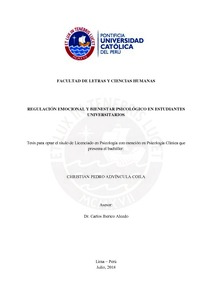Regulación emocional y bienestar psicológico en estudiantes universitarios
Abstract
Actualmente los estudiantes universitarios deben desarrollar diversas actividades académicas
que conlleva un gran esfuerzo emocional, frente a ello necesitan regular las emociones con la
finalidad de cuidar su bienestar. La presente investigación tiene como objetivo principal
examinar la relación entre las estrategias de regulación emocional y el bienestar psicológico
(global y sus 6 dimensiones) en estudiantes universitarios. Además, de manera específica
conocer cuál es el nivel de bienestar psicológico y qué estrategias de regulación utilizan
predominantemente los estudiantes (reevaluación cognitiva y/o supresión). Por último,
examinar si existe diferencia por sexo biológico en las variables principales. La muestra estuvo
conformada por 101 estudiantes, entre 16 y 25 años de edad; se utilizaron dos instrumentos: el
Cuestionario de autorregulación emocional (ERQP) y la Escala de bienestar psicológico de
Ryff; ambos instrumentos se encuentran adaptados al contexto peruano. Entre los resultados,
se obtuvo correlaciones significativas entre la regulación emocional y el bienestar psicológico;
también, se obtuvo correlaciones significativas entre los tipos de regulación emocional y las
sub-escalas de bienestar psicológico. Finalmente, se hallaron diferencias por sexo biológico en
la subescala de Autonomía. Los estudiantes desarrollan las mismas capacidades en la
regulación de las emociones y el bienestar que experimentan. Currently university students should develop various academic activities that carry a great
emotional effort, whereupon they need to regulate emotions to look after their well-being. The
present research has as main objective to examine the relationship between the strategies of
Emotional Regulation and the psychological well-being (global and its 6 dimensions) in
university students. In addition, specifically to know the level of psychological well-being and
what regulatory strategies predominantly use students (cognitive reevaluation and/or
suppression). Finally, examine whether there is gender difference in the main variables. The
sample consisted of 101 students, between 16 and 25 years old; two instruments were used:
Emotional Self-Regulation Questionnaire (ERQP) and Ryff’s scale of Psychological Wellbeing;
both instruments are adapted to the Peruvian context. Among the results, significant
correlations between emotional control and psychological well-being were obtained. Also,
significant correlations between the types of emotional regulation and Ryff’s subscales of
Psychological Well-being were obtained; gender differences were found in the subscale of
Autonomy. Students develop the same abilities in regulating emotions and well experienced.
Temas
Bienestar
Emociones
Estudiantes universitarios--Investigaciones
Emociones
Estudiantes universitarios--Investigaciones
Para optar el título de
Licenciado en Psicología Clínica
Collections
The following license files are associated with this item:






